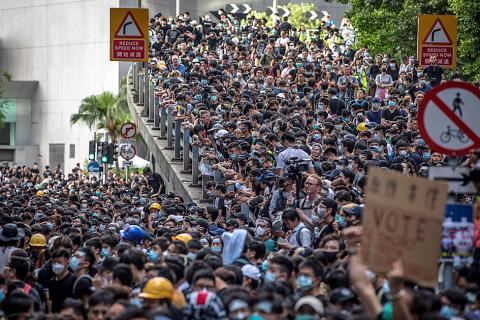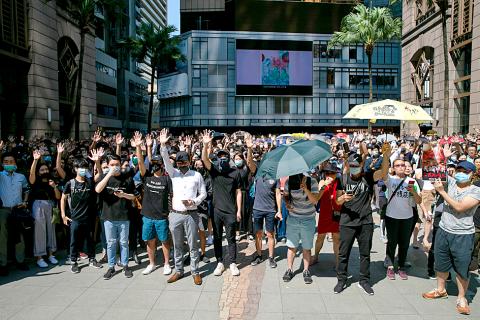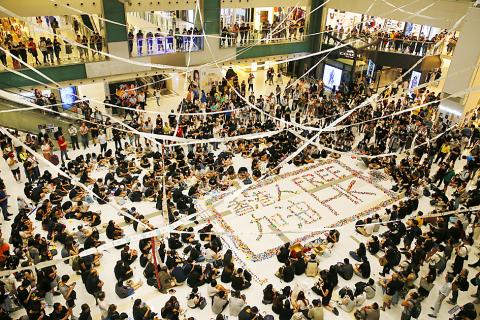Holding up posters saying “Don’t shoot our kids,” Hong Kong residents and schoolmates of a teenage demonstrator shot at close range in the chest by a police officer rallied yesterday to condemn police actions and demand accountability.
The shooting on Tuesday during widespread anti-government demonstrations on China’s National Day was a fearsome escalation in Hong Kong’s protest violence.
The 18-year-old is the first known victim of police gunfire since the protests began in June. He was hospitalized and his condition was yesterday described by the government as stable.

Photo: EPA-EFE
The officer fired as the teen, Tsang Chi-kin (曾志健), struck him with a metal rod.
The use of lethal weaponry is sure to inflame widespread public anger about police tactics during the crisis, widely condemned as heavy-handed.
“The Hong Kong police have gone trigger-happy and nuts,” pro-democracy lawmaker Claudia Mo (毛孟靜) said yesterday.

Photo: EPA-EFE
Mo, who said she repeatedly watched videos of the shooting, echoed what many people expressed.
“The sensible police response should have been to use a police baton or pepper spray, etc, to fight back. It wasn’t exactly an extreme situation and the use of a live bullet simply cannot be justified,” she said.
Several hundred people, including students, chanted anti-police slogans outside Tsang’s school in the Tsuen Wan neighborhood in the New Territories.

Photo: EPA-EFE
Sitting crossed-legged, some held an arm across their chest below their left shoulder — the location of the teenager’s gunshot wound. One held a handwritten message condemning “thug police.”
Schoolmates said that Tsang loves basketball and was passionate about the pro-democracy cause.
A student who wore a Guy Fawkes mask and declined to be named said that Tsang was “like a big brother” to him and other younger students.
“During the protests, we would feel safe if he is around, because he was always the first to charge forward and would protect us when we were in danger,” the student said. “I vividly remember him saying that he would rather die than be arrested. What an awful twist of fate that it was he of all people who was shot by the police.”
Many students felt that firing at Tsang’s chest, close to his heart, was an attempt to kill him.
Police said that Tsang has been arrested, despite being hospitalized, and that authorities would decide later whether to press charges.
More than 1,000 office workers skipped their lunch to join an impromptu march in the business district against the police shooting.
Dozens of black-clad demonstrators also protested at a luxury mall in Kowloon.
Police have defended the officer’s use of force as “reasonable and lawful,” with Hong Kong Police Force Commissioner Stephen Lo (盧偉聰) late on Tuesday said that the officer had feared for his life and made “a split-second” decision to fire a single shot at close range.
Asked why the officer shot at Tsang’s chest instead of his limbs, Deputy Commissioner Tang Ping-Keung (鄧炳強) yesterday said that the officer had fired at an area that could immobilize the youth quickly.
Tang denied that police had been given permission to shoot to kill.
The officer’s action was in line with international procedures, he said, but added that police would mount an in-depth investigation into the shooting.
Hong Kong’s government said that the widespread rioting on Tuesday was “planned and organized,” and called on parents and teachers to help restrain young protesters.
British Secretary of State for Foreign and Commonwealth Affairs Dominic Raab on Tuesday said that the shooting was “disproportionate” and warned that it could risk inflaming the situation.
Some US lawmakers also joined in the condemnation.
China’s liaison office in Hong Kong slammed British and US politicians, accusing them of condoning violence and crime.
“No time should be lost to stop violence, end the chaos and restore order to Hong Kong,” it said in a statement, calling the protesters the “greatest threat to Hong Kong and the common enemy of the international community.”

Chinese Nationalist Party (KMT) lawmakers have declared they survived recall votes to remove them from office today, although official results are still pending as the vote counting continues. Although final tallies from the Central Election Commission (CEC) are still pending, preliminary results indicate that the recall campaigns against all seven KMT lawmakers have fallen short. As of 6:10 pm, Taichung Legislators Yen Kuan-heng (顏寬恒) and Yang Chiung-ying (楊瓊瓔), Hsinchu County Legislator Lin Szu-ming (林思銘), Nantou County Legislator Ma Wen-chun (馬文君) and New Taipei City Legislator Lo Ming-tsai (羅明才) had all announced they

CHAMPIONS: President Lai congratulated the players’ outstanding performance, cheering them for marking a new milestone in the nation’s baseball history Taiwan on Sunday won their first Little League Baseball World Series (LLBWS) title in 29 years, as Taipei’s Dong Yuan Elementary School defeated a team from Las Vegas 7-0 in the championship game in South Williamsport, Pennsylvania. It was Taiwan’s first championship in the annual tournament since 1996, ending a nearly three-decade drought. “It has been a very long time ... and we finally made it,” Taiwan manager Lai Min-nan (賴敏男) said after the game. Lai said he last managed a Dong Yuan team in at the South Williamsport in 2015, when they were eliminated after four games. “There is

Nvidia Corp CEO Jensen Huang (黃仁勳) yesterday visited Taiwan Semiconductor Manufacturing Co (TSMC, 台積電), as the chipmaker prepares for volume production of Nvidia’s next-generation artificial intelligence (AI) chips. It was Huang’s third trip to Taiwan this year, indicating that Nvidia’s supply chain is deeply connected to Taiwan. Its partners also include packager Siliconware Precision Industries Co (矽品精密) and server makers Hon Hai Precision Industry Co (鴻海精密) and Quanta Computer Inc (廣達). “My main purpose is to visit TSMC,” Huang said yesterday. “As you know, we have next-generation architecture called Rubin. Rubin is very advanced. We have now taped out six brand new

POWER PLANT POLL: The TPP said the number of ‘yes’ votes showed that the energy policy should be corrected, and the KMT said the result was a win for the people’s voice The government does not rule out advanced nuclear energy generation if it meets the government’s three prerequisites, President William Lai (賴清德) said last night after the number of votes in favor of restarting a nuclear power plant outnumbered the “no” votes in a referendum yesterday. The referendum failed to pass, despite getting more “yes” votes, as the Referendum Act (公民投票法) states that the vote would only pass if the votes in favor account for more than one-fourth of the total number of eligible voters and outnumber the opposing votes. Yesterday’s referendum question was: “Do you agree that the Ma-anshan Nuclear Power Plant